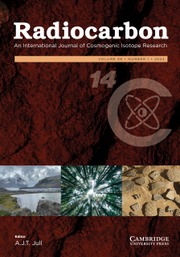Article contents
Possible Effects of Ozone Depletion on the Global Carbon Cycle
Published online by Cambridge University Press: 18 July 2016
Abstract
The increase of UV-B radiation resulting from ozone depletion is considered to have damaging effects on marine ecosystems. A cutback of marine productivity would tend to reduce the oceanic uptake of atmospheric CO2. Box models of the global oceans based on the distribution of bomb-produced 14C are used to evaluate the possible effects of ozone depletion on the atmospheric CO2 concentration. The maximum effect presumably takes place if the ozone hole reduces the marine productivity to zero in the Antarctic Ocean. In a business-as-usual scenario of future CO2 emissions, the atmospheric CO2 partial pressure (pCO2) would increase by an additional 37 μatm over the course of the next century. This increase corresponds to 4.6% of the projected atmospheric pCO2 in the year 2090. However, if the damaging effect caused by the destruction of the stratospheric ozone layer is assumed to lower the productivity over the Antarctic Ocean by 10%, the atmospheric pCO2 would rise by less than 3 μatm over the expected atmospheric level in the next century.
Information
- Type
- III. Global 14C Production and Variation
- Information
- Radiocarbon , Volume 34 , Issue 3: Proceedings of the 14th International Radiocarbon Conference , 1992 , pp. 772 - 779
- Copyright
- Copyright © The American Journal of Science
References
- 2
- Cited by

